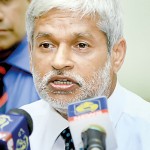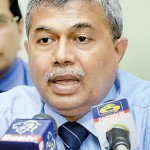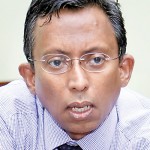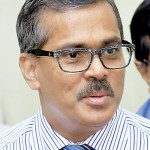News
AMS will be an apolitical union says its President
Lobbying will be the main weapon to solve issues and strike action the very last resort, while we work with dedication for the public good as an apolitical trade union, assured a group of Sri Lanka’s top medical specialists yesterday.

At the high-powered media briefing of the AMS, its President Dr. Nimal Ratnasena makes a point. He is flanked by (from extreme left) Editor Dr. Rohan Gunawardena; Vice President Dr. Lalantha Ranasinghe; Secretary Dr. Ravi Dayasena; Vice President Dr. Sunil Wijayasinghe; Media Spokesperson Dr. Asoka Gunaratne; and an Assistant Secretary Dr. LakKumar Fernando. In the second row from left are: Dr. Daminda Rajamantri; National Organiser Dr. Lalith Perera; and Dr. Mahanama Gunasekara. Pix by Anuradha Bandara
Listing out the three burning issues that the newly-strengthened Association of Medical Specialists (AMS) will focus on, its President and Consultant Surgeon Dr. Nimal Ratnasena told a media briefing that they are the establishment of the Specialists’ Registry, introduction of a Service Minute for Specialists and minimising the issues faced by specialists with regard to new appointments and transfers.
“These are issues we have attempted to solve while we were members of the Government Medical Officers’ Association (GMOA),” said Dr. Ratnasena, adding that they have not been able to do so.
The Saturday noon media briefing in the Consultants’ Lounge of the National Hospital of Sri Lanka was the first by the AMS, following its annual general meeting on April 26, attended by an unprecedented number of specialists (consultants) working in the State health sector.

AMS President Dr. Nimal Ratnasena
Of the 1,846 specialists working in Government hospitals around the country, 90% in most hospitals have joined the AMS, the Sunday Times learns. Earlier most of them were members of the GMOA. The expectation is that by the end of the year 100% of the State-sector specialists would be members of the AMS.

AMS Secretary Dr. Ravi Dayasena
“Ninety-five percent of the specialists at the Lady Ridgeway Hospital for Children, Colombo, where the current GMOA President is working, have joined the AMS,” says an AMS Assistant Secretary and Consultant Paediatrician Dr. LakKumar Fernando.
It is with clinical precision that the AMS explained as to why they were compelled to leave the GMOA and their future plans to win their demands.
According to Dr. Ratnasena even though the AMS has been in existence since 1972 and had been registered as a trade union in 2007, new vigour has been infused within the last year as specialists felt that their issues were not being addressed by the GMOA.Delving into detail, AMS Secretary and Consultant ENT Surgeon Dr. Ravi Dayasena points out that in addition to the five years in medical school and initial training after passing out, it takes about eight more years to become a specialist.
However, there is no register for specialists at the Sri Lanka Medical Council (SLMC) and they are part of the one which includes all (even non-specialist) doctors.

An AMS Assistant Secretary Dr. LakKumar Fernando
Dr. Dayasena said that there is a need to bring in amendments to the laws under which the SLMC has been set up and numerous discussions have been held including with the former Health Minister Maithripala Sirisena (now President), who was very positive about it.
“A separate register is essential because some who are not qualified as specialists are working as specialists, endangering the lives of patients. There has, however, been a delay in bringing about this essential register,” he said. Referring to the Service Minute which governs the appointments, promotions, transfers, salaries and other allowances, Dr. Dayasena said that the AMS would work to establish a Service Minute for specialists.
Grade Medical Officers, a separate category of doctors, won their demands for a pay-hike but there is an anomaly in the salaries of specialists who have toiled in a competitive environment to gain their skills and qualifications in various specialties, he pointed out, adding that the AMS would also hold discussions with the authorities about housing and other facilities for specialists serving in remote areas.

AMS Joint Vice President Dr. Lalantha Ranasinghe
While the current Health Minister Dr. Rajitha Senaratne had held discussions with the National Hospital Consultants in early May about the issues of concern to them, a formal meeting with the Minister has been requested by the AMS, it is learnt.
AMS Joint Vice President (VP) and Consultant Surgeon Dr. Lalantha Ranasinghe pointed out that the GMOA had been an apolitical organisation but of late it has been “somewhat politicised” over which a majority of the GMOA members have been displeased.
“We, the AMS, will remain a trade union without any political affiliations,” he added.
Asked whether the “love affair” between the specialists and the GMOA is over, AMS Joint VP Dr. Sunil Wijayasinghe quips that the “love” is still there but the “affair” is over.
| ‘No’ to three months sabbatical “We are strongly opposed to any suggestion for State-sector specialists to take a sabbatical of three months per year to work in the private sector,” stressed AMS President Dr. Nimal Ratnasena. As a trade union we are “totally” against this suggestion, he said, reiterating that as public servants their priority is to serve the public of this country through the State health sector. “We are working more and not less for the State health sector. We will continue to do so,” Dr. Ratnasena added, when asked about the GMOA’s suggestion for a three-month sabbatical for private practice. |

